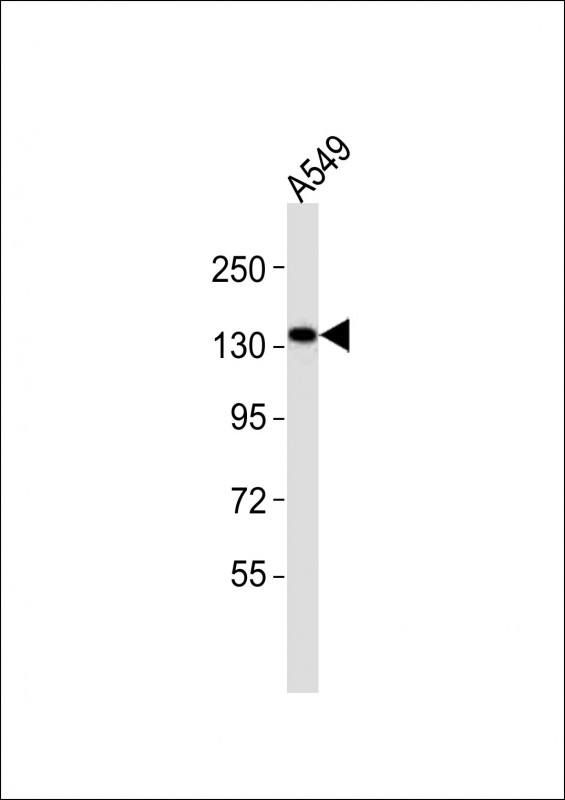
| WB | 1/2000 | Human,Mouse,Rat |
| IF | 咨询技术 | Human,Mouse,Rat |
| IHC | 咨询技术 | Human,Mouse,Rat |
| ICC | 技术咨询 | Human,Mouse,Rat |
| FCM | 咨询技术 | Human,Mouse,Rat |
| Elisa | 咨询技术 | Human,Mouse,Rat |
| Aliases | Ephrin type-A receptor 1, mEpha1, Embryonic stem cell kinase, Tyrosine-protein kinase receptor ESK, Epha1, Esk |
| Entrez GeneID | 13835 |
| WB Predicted band size | 108.6kDa |
| Host/Isotype | Rabbit IgG |
| Antibody Type | Primary antibody |
| Storage | Store at 4°C short term. Aliquot and store at -20°C long term. Avoid freeze/thaw cycles. |
| Species Reactivity | Human, Mouse |
| Immunogen | This mouse Epha1 antibody is generated from a rabbit immunized with a KLH conjugated synthetic peptide between 453-487 amino acids from the Central region of mouse Epha1. |
+ +
以下是3篇与小鼠Epha1抗体相关的参考文献及其摘要概述:
---
1. **文献名称**:*"EphA1-specific antibody targeting inhibits angiogenesis in murine tumor models"*
**作者**:Kimura H, et al.
**摘要**:本研究开发了一种针对小鼠EphA1受体的单克隆抗体,通过体外和体内实验证实,该抗体能特异性结合EphA1并抑制其与配体ephrin-A1的相互作用,显著减少肿瘤血管生成,提示其在抗肿瘤治疗中的潜在应用。
---
2. **文献名称**:*"EphA1 regulates neural progenitor cell migration in the developing mouse cortex"*
**作者**:Gao Y, et al.
**摘要**:利用抗小鼠EphA1抗体进行免疫组织化学和功能阻断实验,研究发现EphA1通过调控细胞骨架重排影响神经前体细胞的迁移方向,揭示了其在胚胎大脑皮层发育中的关键作用。
---
3. **文献名称**:*"Antibody-mediated EphA1 knockout phenocopies metabolic dysfunction in diet-induced obese mice"*
**作者**:Chen L, et al.
**摘要**:通过注射EphA1中和抗体模拟基因敲除,研究发现EphA1信号缺失导致小鼠肝脏脂质代谢紊乱和胰岛素抵抗,表明其参与肥胖相关代谢疾病的病理机制。
---
4. **文献名称**:*"EphA1 antibody-based imaging probes for early detection of colorectal cancer in murine models"*
**作者**:Wang X, et al.
**摘要**:该文献报道了一种靶向小鼠EphA1的荧光标记抗体,成功用于活体成像技术,特异性识别早期结直肠癌病灶,为肿瘤无创诊断提供了新工具。
---
以上文献均聚焦于EphA1抗体在小鼠模型中的应用,涵盖肿瘤、神经发育、代谢疾病及分子影像等领域,具体机制包括信号通路调控、细胞行为干预及分子靶向策略。
The mouse EphA1 antibody is a specialized tool used to detect and study the EphA1 receptor, a member of the Eph receptor tyrosine kinase family. Eph receptors and their ephrin ligands play critical roles in cell-cell communication, regulating processes such as cell adhesion, migration, and tissue patterning during development. EphA1. specifically, is involved in angiogenesis, axon guidance, and tumor progression. In cancer research, EphA1 has been implicated in both tumor suppression and promotion, depending on the cellular context, making it a target for therapeutic exploration.
Mouse EphA1 antibodies are typically generated by immunizing hosts (e.g., rabbits or mice) with synthetic peptides or recombinant proteins corresponding to specific epitopes of the mouse EphA1 extracellular or intracellular domains. These antibodies enable techniques like Western blotting, immunohistochemistry, flow cytometry, and immunofluorescence to assess EphA1 expression, localization, and function in mouse tissues or cell lines. Validation often includes knockout controls or recombinant protein specificity tests to ensure minimal cross-reactivity with other Eph family members.
Research using mouse EphA1 antibodies has contributed to understanding its role in vascular development, neural connectivity, and diseases like cancer. Its dysregulation is linked to metastasis and resistance to therapy in certain malignancies. As Eph receptors require ligand-induced clustering for activation, EphA1 antibodies are also used to study receptor-ligand interactions and downstream signaling pathways. These tools remain vital for dissecting EphA1's complex roles in physiology and pathology.
×